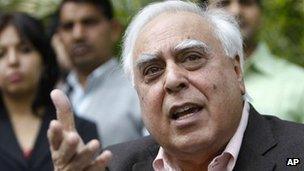India vows crackdown on offensive internet content
- Published

India has vowed to crack down on offensive internet content, accusing web firms of failing to cooperate.
Communications Minister Kapil Sibal met officials from Google, Facebook and other websites on Monday.
On Tuesday he said the firms had told him they were unable to take action.
He said the government would introduce guidelines to ensure "blasphemous material" did not appear on internet. Doctored photos of the PM and Sonia Gandhi have angered the government.
'Give us the data'
Addressing a press conference in the capital, Delhi, on Tuesday, Mr Sibal said he had asked the companies in September to remove images and statements deemed offensive to religious groups, but that they had ignored his requests.
"At a meeting on 4 November, we showed them some of the photos and they too agreed that the photos were offensive," he said.
The minister accused the internet firms of not co-operating.
"They have given it to me in writing that they will not do anything until we get an order from the court," he said.
Mr Sibal said companies would not be allowed to say, "we throw up our hands, we can't do anything about this".
He said: "My aim is that insulting material never gets uploaded. We will evolve guidelines and mechanisms to deal with the issue. They will have to give us the data, where these images are being uploaded and who is doing it."
Before the press conference, Mr Sibal showed reporters morphed photos of Prime Minister Manmohan Singh and Congress president Sonia Gandhi, as well as pigs running through Islam's holy city of Mecca.
The minister said the government did not believe in interfering in the freedom of the press, but "we have to take care of the sensibilities of our people, we have to protect their sensibilities. Our cultural ethos is very important to us".
India has more than 100 million internet users and web companies say the large number means broad action is impossible.
Facebook said in a statement that it recognised the "government's interest in minimising the amount of abusive content available online".
But, it said, there were policies in place that enabled people to report abusive content.
"We will remove any content that violates our terms, which are designed to keep material that is hateful, threatening, incites violence or contains nudity off the service."
Facebook said it would "continue to engage with the Indian authorities as they debate this important issue".
India has 28 million Facebook accounts.
A spokesperson for Google was quoted by the Press Trust of India as saying that it did remove illegal material.
But the spokesperson added: "When content is legal and does not violate our policies, we will not remove it just because it is controversial, as we believe that people's differing views, so long as they are legal, should be respected and protected."
Rajesh Chharia, president of the Internet Service Providers Association of India, told Associated Press that internet companies should be aware of national security issues.
"I am not favouring censorship - self-regulation is the best censorship available to our system [but] we should not do anything which should harm the peace of the country."
- Published18 October 2011
- Published20 November 2011
- Published14 July 2010
- Published8 October 2010
- Published21 December 2009